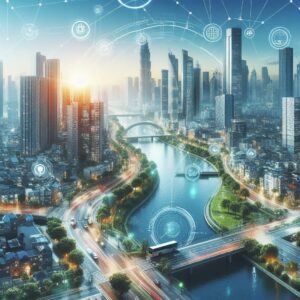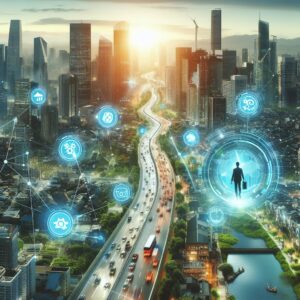Urban landscapes, home to a significant majority of the global population, face mounting challenges stemming from rapid population growth and resource consumption. In response, a wave of innovative sustainability initiatives powered by technology is reshaping urban living. From smart infrastructure and energy-efficient systems to data-driven urban planning, these tech-driven endeavors are revolutionizing cities.

The Rise of Tech-Driven Urban Sustainability
Tech-driven sustainability initiatives are redefining urban landscapes. Smart infrastructure, incorporating IoT sensors and AI, optimizes resource usage by monitoring and managing utilities, waste disposal, and traffic flow. Additionally, energy-efficient buildings equipped with renewable energy solutions and smart grids reduce energy consumption and environmental impact, fostering a more sustainable urban ecosystem. Moreover, data-driven urban planning harnesses big data analytics to optimize city layouts.
Initiatives Shaping Sustainable Urban Living
These sustainability initiatives encompass multifaceted solutions for urban living. From intelligent traffic management systems that mitigate congestion and reduce emissions to waste management programs leveraging sensor technologies for optimized collection and recycling, tech-driven solutions address critical challenges faced by cities. Moreover, initiatives promoting green spaces, sustainable architecture.
Challenges and Opportunities
Despite the promise, challenges persist in implementing tech-driven sustainability at scale. Funding constraints, technological barriers, and interoperability issues pose hurdles. However, these challenges present opportunities for public-private collaborations, innovative financing models, and advancements in technology. By fostering partnerships, encouraging innovation, and fostering a collaborative ecosystem, these challenges can transform into catalysts for sustainable urban development.
In the bustling heart of urban landscapes, a remarkable transformation is underway—tech-driven sustainability initiatives are reshaping the very fabric of cities. These pioneering endeavors harness the power of technology to address pressing environmental challenges and revamp urban living into sustainable, efficient, and livable spaces. Smart infrastructure, incorporating IoT sensors and AI algorithms, stands at the forefront, optimizing resource usage.
From intelligent energy-efficient buildings to data-driven urban planning, these initiatives offer multifaceted solutions. Smart buildings, equipped with renewable energy sources and energy-saving systems, not only curtail resource consumption but also reduce carbon footprints, contributing to a greener cityscape. Simultaneously, data analytics employed in urban planning optimize traffic flow, public transport systems.

Challenges, however, accompany this transformative journey. Funding limitations, technological complexities, and the need for seamless integration pose hurdles. Nevertheless, these challenges are catalysts for innovation and collaboration. Public-private partnerships, technological advancements, and visionary urban policies converge as opportunities to surmount obstacles and propel these sustainability initiatives towards widespread adoption.
Conclusion: Advancing Urban Sustainability
The fusion of technology and sustainability stands as a beacon of hope for urban environments grappling with complex challenges. As tech-driven initiatives continue to evolve, embracing a future rooted in sustainable urban living becomes imperative. Through collaborative efforts, investments in innovative technologies, and a commitment to eco-conscious urban planning, these initiatives not only offer solutions to current urban challenges but also chart a trajectory towards resilient, livable, and sustainable cities.
For more Article like this, visit our Website Here
